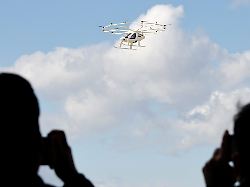Volocopter in the starting blocks
Air taxis are scheduled to fly over Paris as early as 2024
2/2/2023, 4:18 p.m
The trip through the air should be safe, environmentally friendly and resistant to traffic jams: the German company Volocopter wants to conquer the skies over Paris with its flying taxis soon. ticket prices? “Affordable,” promises the boss.
Flying could be so easy: Five-minute check-in with face recognition and weight control, take a seat, buckle up, and humming softly, the helicopter-like air taxi lifts itself vertically into the air. The German company Volocopter wants to make this vision a reality by the Summer Olympics in Paris 2024. “It’s like flying in a helicopter, but without noise and vibration,” explains company boss Dirk Hoke. The 53-year-old, who was previously head of the armaments and space division at Airbus, recently posed in front of a model of the air taxi together with Chancellor Olaf Scholz and French President Emmanuel Macron. The company is a candidate for the German-French business prize, which will be awarded in Paris in the evening.
“Negotiations with the authorities are still ongoing,” says Hoke. However, he is confident that the necessary permits will be granted before the Olympic Games. Approval by the European Aviation Safety Agency is expected in the first half of 2024.
Rules still in progress
A challenge for air taxis, which numerous companies around the world are working on, is the fact that there are hardly any suitable rules for them. Technically, they are a further development of remote-controlled drones, for which strict regulations apply in many countries – for example, they are not allowed to fly near residential buildings or over crowds. Air taxis, however, are to be used in large cities as an alternative to taxis that often get stuck in traffic. It must also be clarified where they should take off and land and which routes they are allowed to fly. For Paris, for example, a shuttle service between the airport and the Olympic Village is conceivable.
The first Volocopters are expected to fly with pilots, although depending on the model, they could also fly controlled from the ground or fly autonomously. “This is not due to technical reasons, but to the guidelines of the certification,” says Hoke. The probability of accidents will be extremely low. “Just as low as operating an Airbus or Boeing aircraft, since the same safety regulations apply.” Compared to a helicopter, an air taxi is much safer because it has more rotors. The Volocopter model has 18 small rotors attached to a circular supporting structure. “If one or two should fail, you can still land safely.”
Battery operation for the carbon footprint
The company from Bruchsal in Baden-Württemberg is planning to operate commercial flights in Singapore parallel to Paris. VW are also entering the market with the “Flying Tiger”, an automated passenger drone that is initially to fly in China, and the Munich-based company Lilium, which is working on a seven-seater with wings. Investors have invested billions in the new flying objects in recent years.
What all these air taxis have in common is that they are battery operated. If these are charged using renewable energy, the CO2 balance would also be better than with a rolling taxi with a combustion engine. “Then we can also support climate change,” explains the Volocopter boss.
And how much should the pleasure of leaving the Paris traffic jams beneath you cost? It should be “affordable,” says Hoke. “Anyone who buys a ticket” can use the air taxi. How many air taxis will initially be used still has to be negotiated with the authorities. But it will hardly become a means of mass transport anytime soon.
